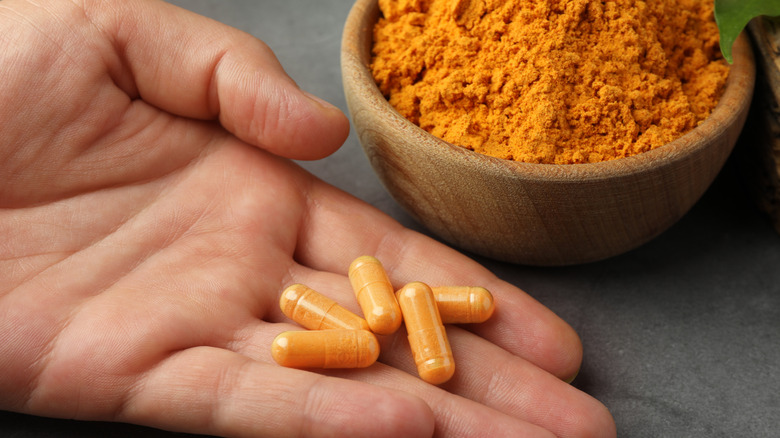When You Take Too Much Turmeric, This Is What Happens To Your Liver
If you are aware of the health benefits of turmeric, you will understand why it has been increasing in popularity in the United States. Long used in Ayurvedic medicine for its anti-inflammatory properties, turmeric is now being explored for a wide range of potential benefits, including easing arthritis pain, supporting brain health, and helping to prevent cancer. While the scientific evidence is still mixed when it comes to turmeric's effects on specific conditions, its active compound, curcumin, is known for its strong antioxidant properties.
Sprinkling a bit of turmeric on your food won't give you much curcumin, which is why many people turn to turmeric supplements. Because curcumin isn't easily absorbed by the body, these supplements often include piperine (a compound found in black pepper) to help increase absorption.
But there's a downside. These concentrated supplements can trigger liver toxicity in some people. A 2023 study in the American Journal of Medicine found a rise in liver injuries linked to turmeric supplements, particularly among people with a certain genetic risk factor. The researchers suggest that the growing use of piperine to boost absorption may be contributing to this trend.
How turmeric may be linked to liver damage
For years, turmeric wasn't considered a major concern when it came to liver health. According to the National Library of Medicine's LiverTox database, earlier research found that while turmeric could cause temporary changes in liver enzyme levels, it didn't appear to cause serious liver damage. Even at doses up to 1,000 milligrams per day in supplement form, side effects were typically limited to skin irritation or mild digestive issues. However, as supplement makers began enhancing turmeric's bioavailability by combining it with ingredients like piperine, reports of liver injury became more frequent.
A 2020 study in the British Journal of Clinical Pharmacology examined several case reports linking turmeric supplements to liver damage. In many of these cases, patients were also taking other medications, but their liver function improved after stopping the turmeric supplement, suggesting a possible connection. One theory is that some turmeric supplements contain synthetic curcumin, which is more stable but may act differently in the body than naturally occurring curcuminoids. Inexpensive supplements may also include chemical residues left over from the manufacturing process, potentially adding to the liver risk.
The LiverTox database also points to an unpredictable reaction in the immune system as a possible factor in turmeric's effect on liver health. A specific genetic marker, HLA-B*35:01, which has also been linked to liver injuries from other herbal products like green tea extract, appears frequently in patients with turmeric-related liver damage (by the way, here are other herbs that are risky for your liver).
When to be careful about turmeric supplements
Drinking a turmeric shot or adding a pinch to your meals is unlikely to harm your liver. However, regular use of high-dose turmeric supplements may pose a greater risk. Turmeric-related liver toxicity can take anywhere from a few weeks to four months to develop. Early symptoms may include fatigue, nausea, and loss of appetite. As liver damage progresses, you might notice dark urine or yellowing of the skin and eyes (jaundice). A doctor can confirm liver issues through blood tests that measure liver enzyme levels. In many cases, liver function improves once turmeric supplements are discontinued. However, more serious cases may require treatment with steroids. (Here are some warning signs from your liver you shouldn't ignore.)
Turmeric isn't right for everyone. People with bleeding disorders or those taking blood thinners should use caution, as turmeric can slow blood clotting and increase the risk of bleeding. It may also interfere with iron absorption, making it a potential concern for individuals with iron deficiency.
Men should also be aware that some research suggests turmeric might reduce testosterone levels and sperm count. While turmeric may help regulate blood sugar, people taking medications for type 2 diabetes should be cautious, as it may cause blood sugar to drop too low. Turmeric may worsen certain gallbladder conditions. Those with gallstones or a bile duct obstruction should avoid turmeric supplements altogether.


